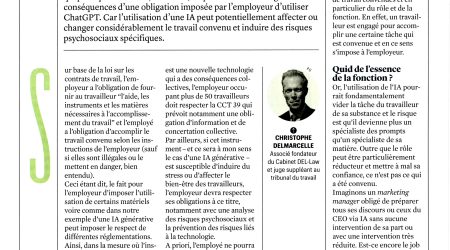The ECJ's Judgment in the Barbulescu Case: Truly Something New?
Posted the 6 September 2017How far can an employer go in monitoring the Internet? On Tuesday, the judges of the Grand Chamber, the highest court of the European Court of Human Rights in Strasbourg, handed down a long-awaited ruling on the balance between corporate security and employee privacy.
Since yesterday, newspapers and legal commentators have been making much of this ECJ ruling, which is even referred to as a landmark decision.
Is this really true? I don't think so in general, and certainly not in a Belgian context in particular.
In reality, the ECJ is simply restating and applying, albeit very clearly, principles that are already well established:
(i) the right to privacy does not stop at the workplace and even professional communications can be covered by the protection due to privacy because even at the workplace and in professional communications the worker is entitled to a sphere of privacy that the employer cannot deny him;
(ii) e-mail, the Internet or the use of a messaging system are ‘communications’ which are protected by nature;
(iii) control by the employer of the use made of the means of telecommunication used in the undertaking is not in itself prohibited and is in fact authorised in principle, provided that such control meets strict conditions intended to ensure a balance between the employer's right to control the performance of his employees and to ensure the functioning of his undertaking and the employee's right to have his private life protected :
a. the concept of a legitimate expectation of privacy implies that the employee must be informed in advance of the possibility of monitoring the means of telecommunication and of the extent, in particular as regards the actual content of the correspondence and the nature of such monitoring. It was this point that weighed most heavily in the ECJ's decision to find the monitoring in breach of Article 8 of the ECHR. Mr Barbulescu had never been clearly informed of the possibility of a review, let alone its scope and nature, and he could not reasonably have expected it or determined its scope;
b. the concept of legitimate and proportionate invasion of privacy, which implies that in the event of monitoring, the employer must ensure that such monitoring is carried out in such a way as to limit as far as possible the invasion of privacy, in particular by limiting the duration of the monitoring, by limiting the monitoring to the stream alone, by limiting the monitoring of the content, for example by using keyword searches, Here again, the ECJ is consistent with its previous rulings, stating that recording all of Mr Barbulescu's telecommunication over an 8-day period and reading, checking and transcribing them in full represented an excessive invasion of his privacy;
c. the concept of the legitimacy of the monitoring, which implies that the monitoring is carried out for legitimate purposes and that this legitimacy is assessed more strictly when the content of correspondence/communications is at stake.
In itself, therefore, there is nothing new. What is interesting, not only because it is included in the final decision, but also because it forms the basis of the dissenting opinion, is the fact that the employee, initially confronted only with the flow of tele-communications, had stated that he had only used the chat system for professional purposes, which led the employer to present him with a transcript showing private and even intimate communications to demonstrate that this statement was false. However, the employee's lie was not enough, as once again the scope of the inspection was deemed to be exaggerated and unnecessarily invasive.
It should be remembered that in Belgium, the problem of monitoring telecommunications is made even more complex by the existence of two criminal provisions governing the secrecy of telecommunications (Article 314 bis of the Criminal Code and Article 125 of the Law of 13 May 2007) and a national collective labour agreement (CCT 81) which, under the guise of simplifying monitoring by the employer, in fact adds additional conditions that are very similar to the teaching of the ECJ.
In my view, therefore, this ruling does not revolutionise the subject in Belgium, but it does have the merit of bringing the fundamentals back into focus.
As for the penalty, it should be noted that Mr Barbulescu's victory was ultimately a bitter one in that he was not awarded damages and the validity of his dismissal was not in itself called into question …
Related articles

Is an employer allowed to mandate the use of artificial intelligence tools by employees ? (Trends, 17-07-2025)

Caution if a former colleague opposed to your employer asks you to testify in their favor
